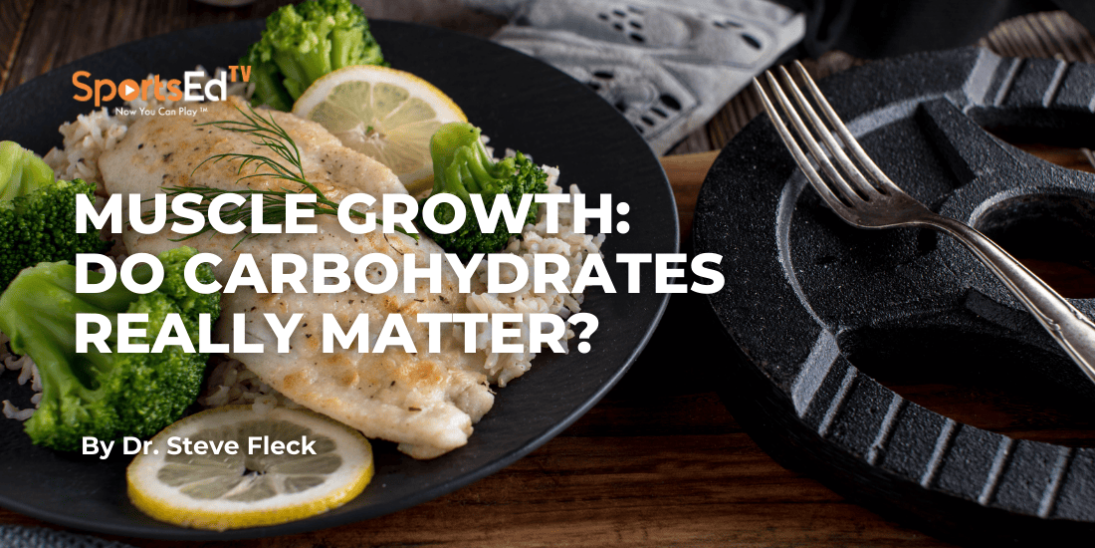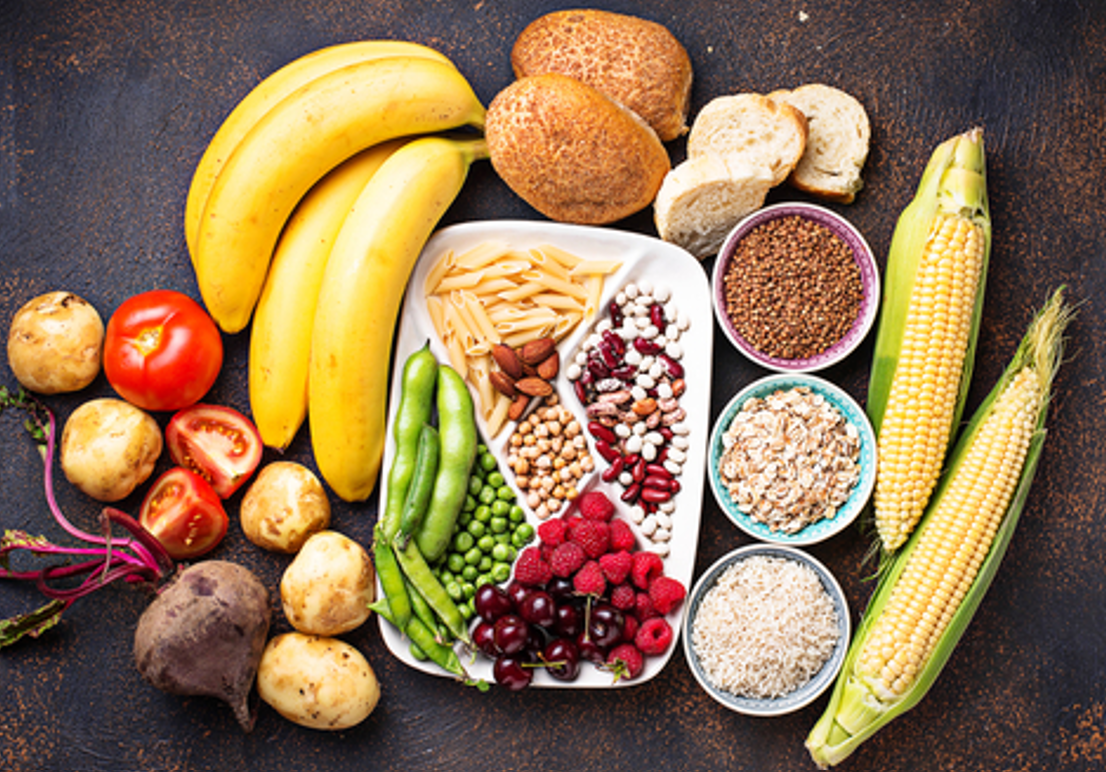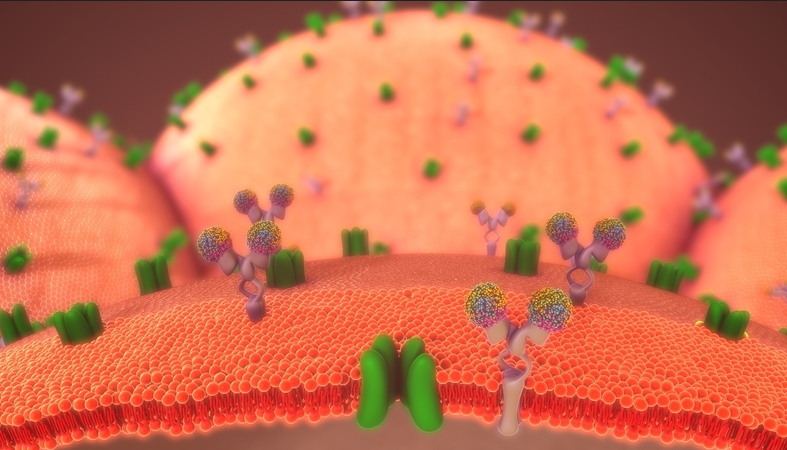Health, Nutrition, Strength And Conditioning
Welcome and thanks for visiting...

Muscle Growth: Do Carbohydrates Really Matter?

Muscle growth is a cornerstone of athletic performance, bodybuilding, and fitness goals. It requires the harmonious interplay of resistance training, recovery, and nutrition. While protein is the indisputable leader in muscle repair and synthesis, the role of carbohydrates has sparked an enduring debate. Are carbohydrates critical in muscle growth, or can you achieve similar results with minimal amounts? This article explores the science, integrating findings from various studies to explore the intricate relationship between carbohydrates and muscle hypertrophy.
What are carbohydrates?
Carbohydrates, commonly called "carbs," are one of the three primary macronutrients essential for human nutrition, alongside protein and fat. They serve as the body’s preferred energy source, breaking down into glucose, which fuels cellular activities and supports physical and mental performance. Found in foods like grains, fruits, vegetables, and legumes, carbohydrates are stored as glycogen in the muscles and liver, providing a readily available energy reserve during high-intensity activities. Beyond their role in energy production, carbohydrates influence various physiological processes, including insulin regulation, glycogen replenishment, and recovery, making them vital for athletes and individuals with active lifestyles.
The most common types of carbohydrates can be categorized into simple carbohydrates and complex carbohydrates:
Simple Carbohydrates:
These quick-digesting sugars provide immediate energy but can cause rapid blood sugar spikes.
- Glucose: Found in fruits and as a key energy source in sports drinks.
- Fructose: Found naturally in fruits, honey, and some sweeteners like high-fructose corn syrup.
- Sucrose: Common table sugar derived from sugarcane or sugar beets.
- Lactose: The sugar found in milk and dairy products.
- Galactose: Less common, typically found combined with glucose in lactose.

Complex Carbohydrates:
These longer chains of sugar molecules digest more slowly, providing sustained energy.
- Starch: Found in foods like potatoes, rice, corn, and wheat-based products (e.g., bread, pasta, cereals).
- Fiber: Found in fruits, vegetables, whole grains, nuts, and legumes. Unlike starch, fiber is not digested for energy but aids digestion and overall health.
- Glycogen: Stored in the liver and muscles; it’s the body’s reserved form of carbohydrate energy.
- Amylose and Amylopectin: Types of starches found in plant-based foods like legumes, grains, and tubers.
These carbohydrates are abundant in foods like whole grains, fruits, vegetables, dairy products, and processed snacks, making them a versatile component of most diets.

Carbohydrates and Energy: The Fuel for Resistance Training
Carbohydrates are the body’s preferred energy source, particularly for high-intensity, short-duration activities like resistance training. When consumed, carbohydrates are stored as glycogen in muscles and the liver. During intense workouts, muscle glycogen serves as the primary fuel, enabling sustained short-term high-energy output.
The Glycogen Hypothesis
One of the foundational arguments for the inclusion of carbohydrates in muscle-building diets is the glycogen hypothesis. Haff (2003) proposed that carbohydrate supplementation during resistance training might preserve muscle glycogen, allowing athletes to perform more high-volume training. Over time, this could lead to greater muscle hypertrophy by enabling a higher total training load. While this hypothesis remains plausible, it lacks direct experimental confirmation. What is clear, however, is that glycogen depletion impairs performance, and carbohydrates are the fastest way to replenish those reserves.
The Synergy Between Carbohydrates and Protein in Muscle Growth
While protein is essential for muscle repair and synthesis, carbohydrates often play a supporting role in recovery and adaptation. They indirectly contribute to muscle protein synthesis by influencing insulin secretion, glycogen replenishment, and recovery time.

The Insulin Connection
Insulin is an anabolic hormone that promotes nutrient uptake by cells, including amino acids required for muscle protein synthesis. Carbohydrates stimulate insulin release, theoretically enhancing the muscle-building process. However, Figueiredo (2013) reviewed existing literature and found that while insulin reduces muscle protein breakdown, the addition of carbohydrates to protein supplements does not consistently increase muscle protein synthesis.
This suggests that protein is the main driver of anabolic responses, and carbohydrates’ role may be limited to creating an optimal recovery environment by reducing catabolic processes.
Recovery and Glycogen Replenishment
Recovery is an essential component of muscle growth. The faster you recover, the sooner you can return to high-quality training. Two meta-analyses, Margolis (2021) and Craven (2021) examined whether combining carbohydrates with protein enhances glycogen synthesis. Margolis found that the combination was superior to carbohydrates alone, which was likely due to increased caloric intake. Craven found no additional benefit, suggesting that carbohydrate-protein synergy may depend on factors such as timing, total intake, and individual metabolism.
For athletes training multiple times a day or engaging in high-volume resistance training, optimizing glycogen replenishment could make a meaningful difference. However, for the average individual training once a day or less, optimizing glycogen replenishment may not be as critical for recovery as sufficient time between training sessions will allow glycogen replenishment on a normal diet.
High-Carbohydrate Diets and Muscle Hypertrophy
High-carbohydrate diets are often recommended for athletes aiming to maximize performance and muscle growth. Carbohydrates provide the energy required for high-intensity workouts, indirectly supporting hypertrophy by allowing athletes to sustain training quality.

Strength and Performance Benefits
Ribeiro (2023), concluded men ingesting higher carbohydrate intake experienced greater strength gains in certain exercises, such as the arm curl, compared to those with lower carbohydrate intake. However, there were no significant differences in overall body composition, suggesting that the strength gains were exercise-specific. This raises an important question: are the benefits of carbohydrates while performing resistance training limited to performance rather than direct muscle growth?
High-Carbohydrate vs. Low-Carbohydrate Diets
The debate between high- and low-carbohydrate diets continues Kruszewski (2024), compared bodybuilders adhering to these dietary patterns. The high-carbohydrate group experienced greater increases in muscle mass and strength, while both groups lost fat. Interestingly, the low-carbohydrate group saw a decline in maximal strength, highlighting the potential limitations of carbohydrate restriction in high-intensity training contexts.
The findings suggest that while muscle growth is possible on low-carbohydrate diets, high-carbohydrate diets may offer advantages in performance and strength development. This distinction is critical for athletes and bodybuilders who rely on maximal strength and high training volumes to optimize their training outcomes.
Carbohydrates and Contest Preparation
Bodybuilders often manipulate carbohydrate intake during contest preparation phases to achieve a specific aesthetic. This practice, known as carbohydrate loading, aims to maximize muscle glycogen storage while reducing subcutaneous fat for a leaner appearance.
The Science Behind Carbohydrate Loading
During carbohydrate loading, glycogen levels in muscles increase, drawing water into the muscle cells and making them appear fuller. Homer (2024) reviewed this practice and concluded that while bodybuilders often report subjective improvements in muscle size and definition, the scientific evidence supporting these claims is limited. The increase in muscle size is temporary and due to glycogen storage, not new muscle growth.
Additionally, carbohydrate depletion followed by loading is thought to enhance fat oxidation, creating a leaner look. However, this effect is more likely related to changes in water balance than actual fat loss. While carbohydrate manipulation may enhance aesthetics, it does not contribute to long-term muscle hypertrophy.
Low-Carbohydrate Diets: Can You Build Muscle Without Carbs?
The rise of low-carbohydrate diets, such as ketogenic and high-fat protocols, has challenged the traditional view that carbohydrates are essential for muscle growth. These diets emphasize fat as the primary energy source, relying on ketosis or fat oxidation to fuel workouts.
Adaptation to Low-Carbohydrate Diets
For athletes on low-carbohydrate diets, the body undergoes metabolic adaptations, increasing its reliance on fat for energy. This can sustain steady-state aerobic activities but may impair high-intensity anaerobic performance due to reduced glycogen availability. Kruszewski (2024) highlighted these limitations, as the low-carbohydrate group experienced declines in maximal strength compared to the high-carbohydrate group.
Practical Applications
Low-carbohydrate diets may still be viable for athletes who prioritize fat loss or metabolic flexibility. With sufficient protein intake, muscle hypertrophy can occur, but the process may be slower or less efficient than when on a high-carbohydrate diet.
Holistic View: Factors Influencing Muscle Growth Beyond Carbohydrates
Muscle growth is a multifaceted process influenced by numerous factors beyond macronutrient composition. While carbohydrates play a role, their importance must be contextualized within the broader framework of training, recovery, and overall nutrition.
Training Intensity and Volume
High-intensity and high-volume resistance training require adequate energy reserves. Carbohydrates are uniquely suited to meet these demands, but athletes with lower energy needs or less frequent training may find their carbohydrate requirements meet while on a normal diet.
Training Intensity and Volume
High-intensity and high-volume resistance training require adequate energy reserves. Carbohydrates are uniquely suited to meet these demands, but athletes with lower energy needs or less frequent training may find their carbohydrate requirements meet while on a normal diet.
Individual Variability
Ribeiro (2023) and Kruszewski (2024), highlight the variability in responses to carbohydrate intake. Factors such as genetics, metabolic flexibility, and training history influence how individuals respond to high- or low-carbohydrate diets.
Total Caloric Intake
Caloric balance is arguably the most important factor in muscle growth. Whether carbohydrates or fats comprise the majority of an athlete’s diet, maintaining a caloric surplus (or at least meeting energy demands) is essential for hypertrophy. Protein remains the cornerstone of muscle-building diets, and adequate intake should always take precedence.
Practical Recommendations for Athletes

Given the complexity of the carbohydrate debate, athletes should consider their unique goals, training demands, and dietary preferences when designing their nutrition plans.
For Strength and Performance Athletes:
A moderate to high carbohydrate intake supports training intensity and recovery. Aim for 4-7 grams of carbohydrates per kilogram of body weight per day, depending on your training volume.
For Bodybuilders and Aesthetic Goals:
Strategic carbohydrate loading during peaking phases can enhance muscle fullness and definition but should not replace a consistent, balanced diet.
For Low-Carb Enthusiasts:
Ensure sufficient protein intake and monitor training performance. Consider targeted carbohydrate intake (e.g., before workouts) to support high-intensity efforts.
For General Fitness:
A balanced macronutrient approach allows flexibility and sustainability, with carbohydrates adjusted based on activity level and personal preference.
Conclusion: Carbohydrates Are a Tool, Not a Rule
Carbohydrates play a significant but not exclusive role in muscle growth. Their primary contributions lie in fueling performance and enhancing recovery, which support strength gains. While high-carbohydrate diets may offer advantages for athletes engaged in intense training, low-carbohydrate diets can also support muscle hypertrophy when protein and caloric needs are met.
Ultimately, prioritizing carbohydrates depends on individual goals, training styles, and dietary preferences. Rather than adhering to rigid dietary dogmas, athletes should create sustainable nutrition plans that align with their objectives. By understanding the nuanced role of carbohydrates, you can tailor your approach to maximize muscle growth and performance.
References
Carbohydrate supplementation and resistance training - Haff (2003)







